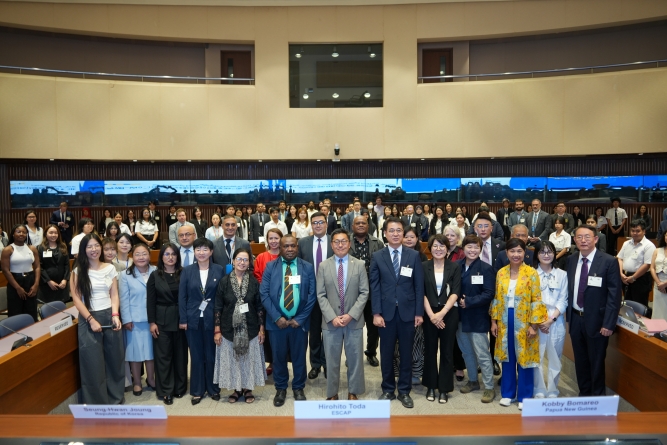
5th International Forum on Low-Carbon Cities: Harnessing Demographic Change for Climate-Resilient Urban Futures
The 5th International Forum on Low-Carbon Cities (IFLCC), jointly organized by the United Nations Economic and Social Commission for Asia and the Pacific (ESCAP), Incheon Metropolitan City and the North-East Asian Subregional Programme for Environmental Cooperation (NEASPEC), convened high-level representatives from governments, cities, international organizations, academia and civil society to deliberate on the theme “Low-Carbon Cities and Demographic Change.”
The Forum was opened by Mr. Hirohito Toda, Deputy Executive Secretary of ESCAP, who underscored the converging challenges of urbanization, climate change and demographic shifts, while affirming cities as ‘engines of the solution.’ He was joined by Mr. Sung Hwan Jeong, Director General of the Environment Bureau of Incheon Metropolitan City, who reaffirmed the city’s ambition to achieve carbon neutrality by 2045, and H.E. Mr. Kobby Bomareo, Minister for Housing of Papua New Guinea, who highlighted the vulnerabilities of Pacific Island States. Ms. Aisa Tobing, Deputy Secretary-General of CityNet, stressed the importance of peer-learning and inclusivity in advancing people-centered climate leadership.
Against the backdrop of rapid urbanization, population aging, and climate challenges, participants showcased that cities are engines of diverse solutions and innovation.
Plenary and thematic sessions highlighted:
- Policy and Governance: Examples from across the region detailed how climate and demographic policies can be integrated into low-carbon urban development, featuring the urban climate planning of ger district in Ulaanbaatar that links national climate strategies, demographic trends, urbanization to address rising temperatures and desertification (Mongolia), participatory neighbourhood redevelopment to create low-carbon, resilient and age-friendly communities (Changning District, Shanghai, People’s Republic of China), public–private partnerships to deliver sustainable initiatives such as New Tashkent City under rapid population growth (Uzbekistan), and the use of digital tools in adaptation policies and smart city innovation, and disaster preparedness to support both climate action and demographic transition (Incheon, Republic of Korea). To maximize co-benefits, strengthen resilience, and ensure sustainability across rapidly changing urban landscapes, the need for integrated approaches was repeatedly underlined.
- Innovation and Technology: Case studies from across the region showcased innovative designs and technology that cities adopted to accelerate decarbonization and resilience in the face of demographic shifts, including designing demand-responsive mobility to address gaps in public transport for aging populations and poorly served neighbourhoods (Suwon, ROK), integrated Mobility-as-a-Service (MaaS) systems in citizen-centred urban strategy to low emissions and enhance accessibility (Russian Federation), and leveraging smart heating systems, digital infrastructure, and PPP-financed redevelopment in response to infrastructure needs reshaped by rural-urban migration. (Ulaanbaatar, Mongolia)
- Partnerships and Implementation: From integrated governance and transport electrification to advance low-carbon development (Shenzhen, China), transforming to governance of care to protect informal women workers from climate extremes using climate insurance schemes (India, ICLEI), strengthening national–local platforms and local ownership to better support cities in diffusing low-carbon practices (ASEAN SDGs Frontrunner Cities Programme, IGES), and the examples in Future Ready Urban Governance for Low-Carbon Cities initiative (UNDP), inclusive, integrated and adaptive governance is repeatedly highlighted as a central driver for translating global climate goals into actionable local pathways. By presenting experiences and lessons learned, cities, networks, and initiatives across the region highlighted how inclusive governance, partnerships, and community engagement can translate global climate commitments into local realities. Drawing on the funding imbalance that hindered scale-up (ASEAN SDGs Frontrunner Cities Programme, IGES), and the efforts of implementing global commitments with the New Collective Quantified Goal, the MAP Initiative and Baku Continuity Coalition (Azerbaijan), financing and multi-level coordination to link global commitments are also underscored as essential for sustainable livelihoods and long-term impact.
In closing, Mr. Riccardo Mesiano, Deputy Head of ESCAP East and North-East Asia Office, emphasized that smart cities can deliver both decarbonization and inclusivity, while Mr. Curt Garrigan, Chief of ESCAP’s Sustainable Urban Development Section, outlined how outcomes from the Forum will inform regional and global processes, including the 2026 review of Sustainable Development Goal 11, the Secretary-General’s
Quadrennial Report on the New Urban Agenda, and the Ninth Asia-Pacific Urban Forum (APUF-9) in Yokohama in 2027.
The Forum reaffirmed the centrality of cities in delivering climate-resilient, inclusive and sustainable urban futures. By bringing together leaders across sectors and regions, it highlighted the collective responsibility to align demographic transitions with low-carbon pathways, ensuring no one is left behind in the pursuit of sustainable development.
Participants included ministers, senior officials, and experts from Azerbaijan, Japan, Mongolia, Papua New Guinea, the People’s Republic of China, the Republic of Korea, the Russian Federation, and Uzbekistan, alongside representatives from UN ESCAP, UNDP, UN-Habitat, ICLEI, CityNet, the Institute for Global Environmental Strategies (IGES), the Asian Infrastructure Research Institute (AIRI), and other international and regional partners.
 Back to News
Back to News